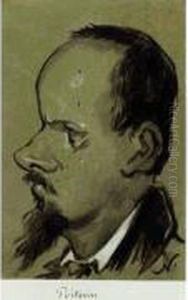Auguste Poitevin Paintings
Auguste Poitevin, born in 1819 and deceased in 1873, was a French sculptor known for his work during the mid-19th century, a period that saw a significant evolution in the arts within the context of the European cultural scene. Poitevin was a part of the Romantic movement which was characterized by an emphasis on emotion and individualism as well as glorification of the past and nature.
Poitevin's sculptures often reflected the Romantic interest in expressing the grandeur and drama of human experience. His works were typically marked by a strong sense of movement and emotion, with detailed attention to physical features and anatomy that highlighted his subjects' inner life and character. Although not as widely recognized as some of his contemporaries, such as Auguste Rodin, Poitevin contributed to the richness of French sculpture in an era that produced many notable artists.
Throughout his career, Poitevin participated in various Salons, the official art exhibitions of the Académie des Beaux-Arts in Paris. These exhibitions were crucial for artists of the time, as they were a means of gaining recognition and patronage. Poitevin's sculptures were often inspired by mythological themes, a common trait within the Romantic movement, as well as by historical figures and events.
Unfortunately, despite his talents, Poitevin did not attain the same level of fame as some of his peers. His works, however, can still be appreciated today in museums and collections that house 19th-century French art. The sculptor's legacy is one of passion and dedication to the craft, and his contributions continue to be studied by art historians interested in the Romantic era of French art.
Auguste Poitevin's death in 1873 marked the end of a career that had seen the creation of a number of emotionally resonant and technically accomplished sculptures. His life and work remain as a testament to the rich artistic milieu of 19th-century France and the enduring appeal of the Romantic movement in European art history.
